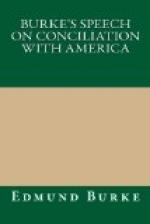Sir, during that state of things, Parliament was not idle. They attempted to subdue the fierce spirit of the Welsh by all sorts of rigorous laws. They prohibited by statute the sending all sorts of arms into Wales, as you prohibit by proclamation (with something more of doubt on the legality) the sending arms to America. They disarmed the Welsh by statute, as you attempted (but still with more question on the legality) to disarm New England by an instruction. They made an Act to drag offenders from Wales into England for trial, as you have done (but with more hardship) with regard to America. By another Act, where one of the parties was an Englishman, they ordained that his trial should be always by English. They made Acts to restrain trade, as you do; and they prevented the Welsh from the use of fairs and markets, as you do the Americans from fisheries and foreign ports. In short, when the Statute Book was not quite so much swelled as it is now, you find no less than fifteen acts of penal regulation on the subject of Wales.
Here we rub our hands.—A fine body of precedents for the authority of Parliament and the use of it!—I admit it fully; and pray add likewise to these precedents that all the while Wales rid this Kingdom like an incubus, that it was an unprofitable and oppressive burthen, and that an Englishman travelling in that country could not go six yards from the high road without being murdered.
The march of the human mind is slow. Sir, it was not until after two hundred years discovered that, by an eternal law, providence had decreed vexation to violence, and poverty to rapine. Your ancestors did however at length open their eyes to the ill-husbandry of injustice. They found that the tyranny of a free people could of all tyrannies the least be endured, and that laws made against a whole nation were not the most effectual methods of securing its obedience. Accordingly, in the twenty-seventh year of Henry the Eighth the course was entirely altered. With a preamble stating the entire and perfect rights of the Crown of England, it gave to the Welsh all the rights and privileges of English subjects. A political order was established; the military power gave way to the civil; the Marches were turned into Counties. But that a nation should have a right to English liberties, and yet no share at all in the fundamental security of these liberties—the grant of their own property—seemed a thing so incongruous that, eight years after, that is, in the thirty-fifth of that reign, a complete and not ill-proportioned representation by counties and boroughs was bestowed upon Wales by Act of Parliament. From that moment, as by a charm, the tumults subsided; obedience was restored; peace, order, and civilization followed in the train of liberty. When the day-star of the English Constitution had arisen in their hearts, all was harmony within and without—
“—simul
alba nautis
Stella refulsit,
Defluit saxis agitatus
humor;
Concidunt venti, fugiuntque
nubes,
Et minax (quod sic voluere)
ponto
Unda recumbit.”
[Footnote: 49]




